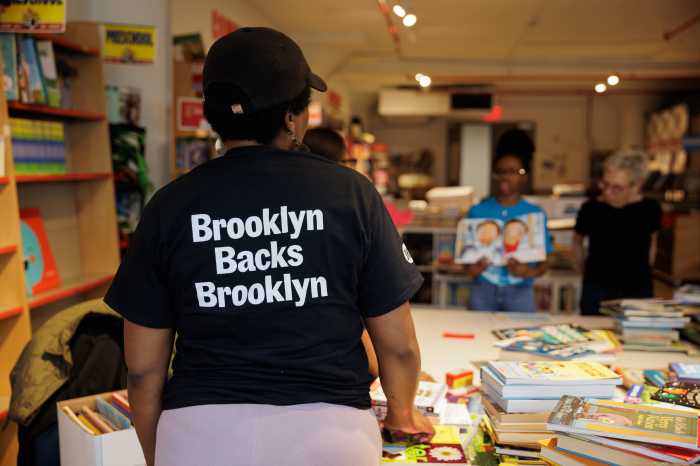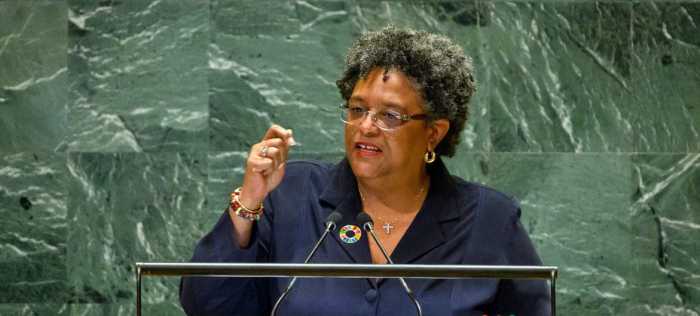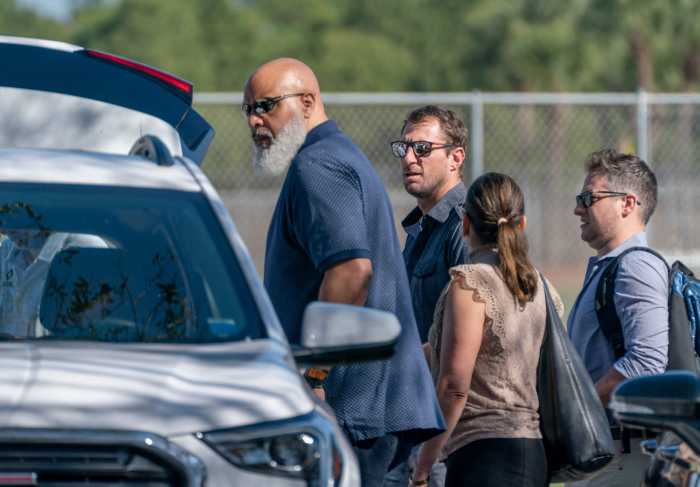Comedian still defends virulent homophobia as all in a day’s work
Eddie Griffin can be very funny. Just catch him in “Undercover Brother,” “Scary Movie 3,” or “Deuce Bigelow: Male Gigolo.”
The brassy comic can also be quite politically astute about being black in America. Just rent his concert film, “DysFunkTional Family,” to experience his essence, but by all means, turn it off after 50 minutes if you want to avoid the verbal queer bashing.
How bad is it? First, Griffin notes how he doesn’t like those sneaky fags, and begins pondering why black gays are so much more flamboyant than whites as he starts sashaying across the stage. Then he warns you have to be careful of gays because they’re dangerous. Anyone who can take a “dick up his ass and is still smiling” is no one to fool with.
But the really dreadful material has just begun. Wait until Eddie avows that if he had a gay son, “he’d tie him to a bed and send in a whore every hour.” How can any father be proud of a having a gay son he inquires bewilderedly.
Then making believe he’s a proud pop with a “fag” for a child, he does a long riff, which includes: “That son of mine can sure suck dick” and so forth.
Perturbed by these hateful riffs, when Griffin was on the Howard Stern Show, I phoned in and asked sweetly, “Eddie, why is your new film so homophobic?”
He replied, “Hey, man. It’s a comedy! It’s a comedy!”
Well, was I overreacting? Not according to reviews of Griffin on the following web sites: Slant (“a homophobe in the strictest sense”); Planet Sick-Boy (“Griffin’s new film outs the star as a bigot and a homophobe”); and The Village Voice (“a racist, misogynistic provocateur”).
But if this is all true, why has Cheryl Dunye, a prize-winning, radical, black lesbian who helmed “The Watermelon Woman,” directed “My Baby’s Daddy,” a film in which Griffin both stars and co-wrote?
This slight, affable comedy tells of three losers who get their girlfriends all pregnant on the very same day.
Nine months passes, and the boys, who are proud of their immaturity, suddenly discover love and responsibility, but not until after Lonnie (Griffin) finds out he doesn’t love his baby’s mom, G (Anthony Anderson) is deserted by his Asian gal pal for robbing a store, and Dominic (Michael Imperioli) loses his love to a lesbian.
The surprise of surprises is that first, the handling of the lesbian subplot is rather respectful and second, there is a five-second shot of two gay men in a child-rearing class and they are not swishers.
What’s the story?
As Gregory B. Lewis notes in his Public Opinion Quarterly piece, “Black-White Differences in Attitude Toward Homosexuality and Gay Rights,” “Black homophobia has been cited as a contributing factor in slowing mobilization against AIDS in the African-American community, as an obstacle to black lesbians and gay men in coming to terms with their sexuality, and as a challenge to the legitimacy of the gay rights movement.”
Peter Tatchell, writing for The New Statesman about the gay bigotry of some African American singers, adds, “The silence of many black leaders gives anti-gay bigotry free rein in parts of the black community.”
To get some answers, I got together last week with stars, Griffin and Anderson, just as “My Baby’s Daddy” opened in theaters around town.
Entering a suite at the Essex Hotel where I awaited him, the angelic-looking Griffin, attired in a classy white sweat suit with a matching baseball cap worn backwards, responded gruffly when asked about the politics of his movies:
“Pah-lie-tics? There’s no such thing as politics. Break the word down,” he said. “What’s a tic? A blood-sucking organism. What’s a lie if it ain’t a lie? And who are they lying to? Poor people. So let’s move on past that. [“My Baby’s Daddy”] is not CNN. It’s just a comedy. I’m not here to change the world. I’m here to change your mind.”
But when asked about Dunye, his face lit up with a grin: “Cheryl Dunye. I hired the young lady. We went through a bunch of different choices of directors, and she walked in the room, and I had seen the piece that she did on Showtime, ‘Stranger Inside.’ It was about women in the penitentiary, which had a lot of heart to it. It wasn’t just another penitentiary film. Then when we sat in the room, the way Cheryl articulated her view of the script––this, that and the other––she was right on point. I said, ‘We need a woman’s sensibility in this because two men wrote the story, and you gonna end up having too much testosterone in the situation.’ So when Cheryl came, I said, ‘Yeah, let’s go that route because she’ll keep the checks and balances.’ So she did quite a job. I’m proud of the sister.”
As for Dunye’s insights into the lesbian characters?
Griffin intoned loudly, “Yes, she’s got a whole lot of insight on that.”
“But when you wrote the film,” I asked, “did you imagine the two attractive women who got the lesbian parts, or did you see one lesbian as a bull dyke? And did Cheryl have to counter you with a no, no, they can be pretty.”
Shaking his head, Griffin insisted, “No, I never looked at lesbians as bull dykes or as your big, old handsome women. I mean that’s like a cliché going back to the 60s or something like that. Most of the lesbians I know are quite the sexy motherfuckers. Yes. I’m just trying to cross them back over.”
Turning back to “DysFunkTional Family,” I note the line about a gay son tied to a bed and the approaching whore. Has his consciousness about gay issues been raised since that film?
“See, I’m glad you asked that question,” Griffin purred. “Now you’re going to learn the difference between comedy and movies. What you witnessed before about tying a son to the bed, what father’s actually going to that? So, of course, that is a joke.”
I reply my father had done that to me.
“I’m sorry to hear that,” Griffin sat back before giving my thigh a friendly pat. “To each your own. But, my gay brother, I’m going to help you out. Gay people are always saying we want to be treated like everyone else. If you watched the comedy concert film, I talked about everybody and their mommas. I talked about Asians. I talked about white folks. I talked about niggers. I didn’t let nobody go. So if you want to be all inclusive like I say, then laugh at the shit, motherfucker. Loosen your tight ass.”
Then it was time to chat with the sweet Anthony Anderson, who stars in the successful TV show “All About the Andersons,” and who has appeared in “Barbershop,” “Kangaroo Jack,” and the upcoming “Agent Cody Banks 2: Destination London.”
Immediately, the robust actor feigns surprise to hear that Cheryl Dunye was a groundbreaking lesbian filmmaker.
“Is she a lesbian?” he asked incredulously.
I nod.
“To look at Cheryl, you would never have thought she was a lesbian,” he noted.
“One would never think you were straight,” I countered flirtatiously.
Anderson laughed.
I then asked, “If a man had directed ‘My Baby’s Daddy,’ don’t you think the film would have gone over the top, possibly being misogynous or homophobic?”
“You know what, man?” Anderson smiled. “I like your questions. First of all. I don’t think if a man had directed this, it would have been squeamish or anything because men have sensibilities and can be sensible to things. As for Cheryl, I just thought she was a great person and director for the job. She being a woman and she’s a lesbian, I don’t know what that adds to a project. I don’t think she was brought on to the project because of those things. She was brought on because of her directorial abilities. She came and she knew what she was doing. She had a vision, she had a plan, and she stuck to it as well as she could, as many directors do who fight with producers, and fight with studios, and fight with the writers. There’s a lot that’s going on, but I think she held her own. And I think we have a quality piece in ‘Daddy.’… Talent, you know, always transcends what you are.”
We also publish:




































